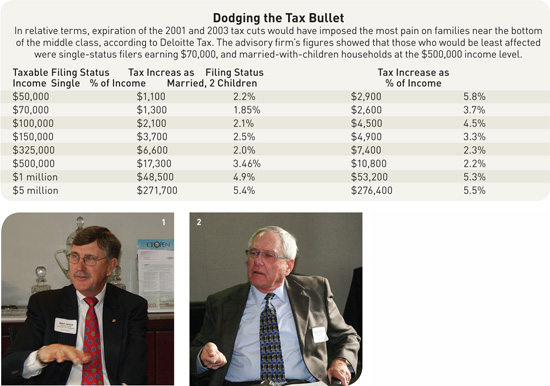
According to Julie Welch, this charitable RMD keeps adjusted gross income lower. Better still, said Weaver, this works not only for the affluent, but also for “grandma and grandpa who write a check to the church every month.”
Sophisticated charities monitor changes in tax law and apprise their donors of the same. Welch, who advises her own church on such changes, elaborated that charities “that are on top of it” watch for opportunities like this “because it is something that is a great benefit in limited circumstances.”
“Larger, more sophisticated charities use every tactic in the book,” said Weaver. “Haven’t your universities tried to get you to put together some kind of estate plan?”
Bob Hodgdon, who serves on the Board of the Servant Christian Community Foundation, commented that fund raising had been successful this past year, and most of the money had been local. Good planning, he noted, makes a difference for charities as well as for businesses.
Political Climate
David Weaver asked what the political climate would be like going forward. Knowing this, financial advisers would have a much better handle on how to help their clients prepare for the future.
“Everyone associated with business is part of the tax relief coalition,” answered Mike Esser, “and they will defend [the provisions of the Tax Relief Act] to death.” This support underlies his confidence that the deal will persist at least through 2012.
Weaver sees the popular press as an enemy of estate tax relief. The way to counter its baleful impact, he believes, is by educating clients.
Steve Harrison of Edward Jones defined the current climate as the “I think” era. He was referring to the media talking heads who have pumped out information, however dubious, to last another thousand years.
Legislative Future
Jim Betterman warned that there are other legislative issues to watch out for in the next few years. He cited as an example provisions relating specifically to farmers and ranchers. “There were proposals floating around that the special use valuation would become unlimited,” said Betterman.
There was also a proposal on the table that would apply to any closely held business, but this proposal did not make it through to the final bill. “These things have made more progress on this round than they have ever before,” said Betterman. He expects to see them back on the table two years from now.
Myron Sildon addressed the issue of Employee Stock Ownership Plans, or ESOPs as they are commonly known. “I haven’t heard anything said to cut off ESOPs,” said Sildon. He explained that ESOPs can be a valuable tool for avoiding capital gains taxes.
“They are still here and they’re a great technique,” said Steve Harrison of ESOPs, “but as many of them blow up there seems to be reluctance on the part of most businesses to go the ESOP route.”